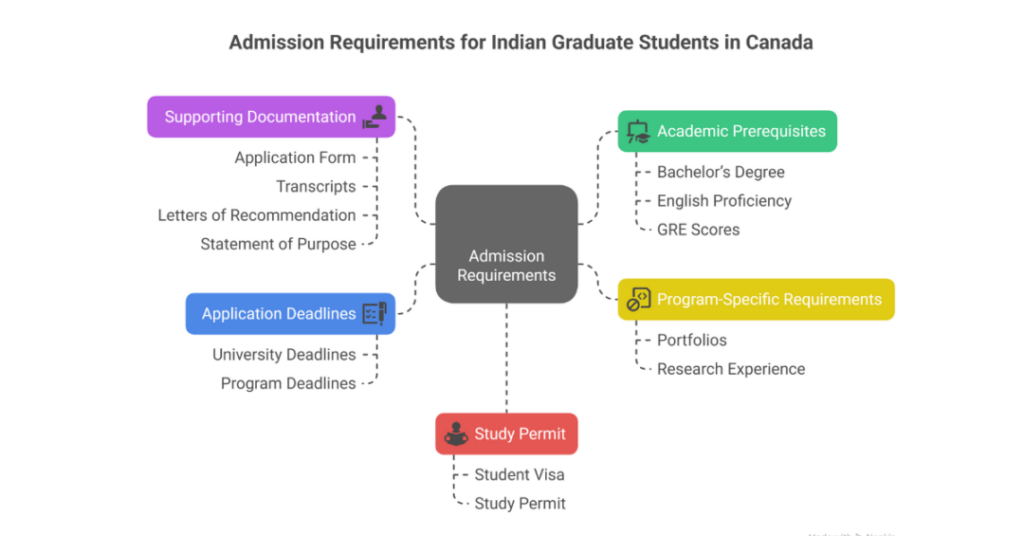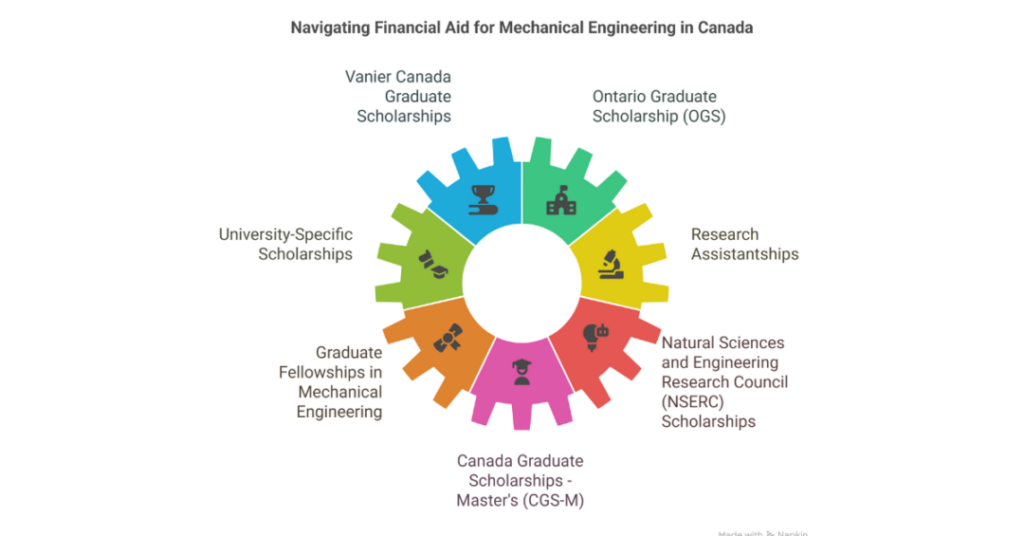10 June 2025
7 minutes read
Masters in Mechanical Engineering in Canada: A Complete Guide for Indian Student

Key Takeaways
- Masters in Mechanical Engineering in Canada: Top universities offer specialized programs in robotics, thermofluids, and materials science, with tuition fees ranging from $8,700 to $50,000 per year.
- Financial Support for Indian Students: Scholarships like Vanier Canada Graduate Scholarships and research assistantships can help reduce tuition costs.
- Career Opportunities Post-Graduation: Graduates can pursue high-demand roles in aerospace, automotive, and energy systems with strong earning potential.
Canada remains one of the top destinations for international students pursuing a Master of Engineering (MEng) in Mechanical Engineering. With renowned universities offering advanced programs in areas like robotics, fluid mechanics, and aerospace, Indian students can gain a competitive edge in the global job market.
However, navigating admission requirements, application deadlines, and securing scholarships can be overwhelming. But don’t worry, this guide breaks down everything you need to know about applying for a mechanical engineering degree in Canada, ensuring a smooth path to success in 2025.
Why Choose Canada for a Masters in Mechanical Engineering?
Canada offers top-tier graduate programs in Mechanical Engineering, featuring specialized tracks like thermofluids, solid mechanics, and automation. With renowned universities and comprehensive programs in applied science, such as MEng and MSc, students gain access to world-class research, career opportunities, and research assistantships.
The combination of practical coursework, advanced materials, and cutting-edge technologies prepares Indian students for success in global engineering careers. With competitive tuition fees, scholarships for International students, and streamlined online applications, pursuing a mechanical engineering degree in Canada is an excellent choice for postgraduate studies.
10 Top Universities Offering Masters in Mechanical Engineering in Canada
Canada is home to some of the best universities offering a Master’s in Mechanical Engineering. These institutions provide strong research opportunities and excellent career prospects for international students, particularly those interested in research and development, manufacturing processes, and machine design.
The combination of course-based and research-based programs ensures that graduates are equipped with proficiency in areas like heat transfer, fluid dynamics, and automation. Here’s a list of the top universities in Canada offering a Master of Engineering in Mechanical:
| University | Specializations Offered | Program Details | Average Tuition Fees (CAD) |
|---|---|---|---|
| University of Toronto | Machine Design, Mechatronics, Thermofluids | Highly reputed Faculty of Graduate Studies with extensive research areas | $20,000 – $50,000 per year |
| University of British Columbia | Robotics, Thermal Systems, Fluid Mechanics | Offers both course-based (MEng) and research-based (MASc) programs | $8,700 – $22,000 per year |
| McGill University | Power Systems, Automation, CAD | Combines theoretical learning and hands-on projects | $18,000 – $24,000 per year |
| University of Waterloo | Manufacturing Processes, Materials Science | Strong industry connections and research assistantship opportunities | $15,000 – $25,000 per year |
| McMaster University | Heat Transfer, Combustion, Composite Materials | Focus on mechanical systems and research in applied science | $18,000 – $30,000 per year |
| University of Alberta | Kinematics and Dynamics, Thermodynamics | Offers a balanced mix of coursework and research-driven learning | $10,000 – $20,000 per year |
| University of Calgary | Mechanical Systems, Fluid Mechanics | Great for Indian students interested in the mechanical engineering program | $13,000 – $24,000 per year |
| Queen’s University | Design and Manufacturing, Materials Science | Offers a solid grounding in both fundamental and specialized mechanical systems | $15,000 – $25,000 per year |
| Western University | Biomechanics, Machine Design | Research-oriented with a focus on thermal systems and biomechanics | $12,000 – $22,000 per year |
| Carleton University | Aerospace, Thermofluids | A Canadian university offering a course-based MEng program with strong research council support | $14,000 – $22,000 per year |
Admission Requirements for Indian Graduate Students to Masters in Mechanical Engineering in Canada
Applying for a Master’s in Mechanical Engineering in Canada can be a rewarding step toward advanced studies and a promising career in engineering. However, Indian students need to be aware of specific admission requirements for successful applications.

Whether applying for a Master of Engineering (MEng) or Master of Science (MSc) in Mechanical Engineering, the process involves meeting academic prerequisites, submitting supporting documentation, and adhering to deadlines. Here are the key admission requirements for Indian students:
- Bachelor’s Degree: A recognized undergraduate degree in Mechanical Engineering or a related field, with strong academic performance.
- Proficiency in English: Proof of English language proficiency through IELTS, TOEFL, or equivalent tests.
- GRE Scores: Some universities may require GRE scores, especially for MSc programs, though many MEng programs may waive this requirement.
- Application Form: Complete the online application form for the engineering program, submitted via the university’s official portal.
- Transcripts and Supporting Documentation: Academic transcripts, letters of recommendation, and a statement of purpose, explaining your research interests, career goals, and why you want to study in Canada.
- Program-Specific Requirements: Some universities may require portfolios or additional documents for specializations like design and manufacturing, combustion, or mechanical systems.
- Research Assistantships: For MSc or Master of Applied Science (MASc) applicants, proof of research experience may be required, as research assistantships are available in specific areas.
- Application Deadlines: Adhere to application deadlines for each university, as these vary for different programs and intake periods.
- Study Permit: Secure a study permit or student visa to study in Canada once you have been accepted into the program.
Each university’s faculty of graduate studies may have its own set of requirements, so it’s important to check program details for specific application criteria.
Cost of Studying Masters in Mechanical Engineering in Canada
When considering pursuing a Master’s in Mechanical Engineering in Canada, it’s essential for Indian students to factor in the cost of living. While tuition fees can vary, the cost of living will depend on the city, lifestyle, and whether you live on or off-campus.
Budgeting for housing, food, transportation, and personal expenses is crucial to manage finances during your postgraduate mechanical engineering studies. Here’s an estimated breakdown of the monthly cost of living for students in Canada:
| Expense | Estimated Monthly Cost (CAD) | Notes |
|---|---|---|
| Accommodation | $800 – $2,500 | Depending on location (e.g., Vancouver, Toronto) and living situation (shared or private) |
| Food and Groceries | $300 – $600 | Self-cooking vs eating out; cheaper in smaller towns |
| Transportation | $100 – $150 | Public transport (bus, subway); car costs if applicable |
| Health Insurance | $60 – $100 | Mandatory for international students in many provinces |
| Personal Expenses | $100 – $300 | Entertainment, mobile bills, etc. |
| Study Materials/Books | $50 – $100 | Depends on course-based programs and research requirements |
| Miscellaneous | $100 – $200 | Extra costs like social activities, events, etc. |
These estimates vary based on the city and personal lifestyle. For students in large cities like Toronto or Vancouver, costs may be on the higher end, while smaller cities or towns tend to be more affordable. It’s important to plan accordingly and take advantage of university support for Indian students to manage costs.
Scholarships and Financial Aid for Masters in Mechanical Engineering Degree in Canada
For Indian students considering a Master’s in Mechanical Engineering in Canada, securing scholarships and financial aid is an important step in managing the cost of education. Numerous funding opportunities are available for postgraduate mechanical engineering students, ranging from merit-based scholarships to research assistantships.

Many Canadian universities also offer specific grants for international students, including those pursuing specialized master’s programs in mechanical engineering, automatic controls, and turbine systems. Here’s a table outlining some of the popular scholarships and financial aid options for students applying for a Master’s in Mechanical Engineering in Canada:
| Scholarship Name | Eligibility | Details | Application Process |
|---|---|---|---|
| Vanier Canada Graduate Scholarships | Highly competitive; Canadian and international students | Merit-based scholarship for doctoral and master’s students. Covers tuition fees, living expenses. | Online application via Canadian universities. |
| Ontario Graduate Scholarship (OGS) | For students in Ontario universities | Supports graduate students in the province, available for Master’s programs. | Application submitted online to participating universities. |
| University-Specific Scholarships | Varies by university | Many Canadian universities offer merit-based scholarships for international students pursuing mechanical engineering. | Check the university’s Faculty of Graduate Studies for specific details. |
| Research Assistantships | Master’s students, particularly in research-based programs | Provides funding for students working in research projects (combustion, thermodynamics, turbine systems). | Faculty members may offer research positions directly. |
| Graduate Fellowships in Mechanical Engineering | Mechanical Engineering students | Offered by the Department of Mechanical Engineering, covers tuition and living expenses. | Apply through the university’s online application portal. |
| Natural Sciences and Engineering Research Council (NSERC) Scholarships | Students applying for research programs in mechanical engineering | NSERC supports students involved in engineering research (e.g., heat transfer, materials science). | Apply through NSERC’s online portal and university-specific instructions. |
| Canada Graduate Scholarships – Master’s (CGS-M) | Students applying for a master’s program in Canada | Merit-based scholarships for students pursuing master’s programs, available for Indian students. | Apply through university’s graduate studies office. |
Career Opportunities After a Masters in Mechanical Engineering in Canada
A Master’s in Mechanical Engineering in Canada opens a wide range of career opportunities, particularly due to the country’s strong demand for engineers in various industries. From automotive design to robotics, students who complete their engineering in mechanical engineering programs gain specialized knowledge in areas like turbine systems, materials science, and automation. Canadian companies, as well as multinational corporations, actively seek graduates with a combination of coursework and hands-on experience in mechanical systems and advanced engineering.
Here’s a table outlining key career opportunities after completing a Master’s in Mechanical Engineering in Canada:
| Job Title | Industry | Job Description | Key Skills Required |
|---|---|---|---|
| Mechanical Engineer | Manufacturing, Automotive | Design and develop mechanical systems, tools, and machinery. | CAD, machine design, manufacturing processes, thermodynamics |
| Research and Development Engineer | Aerospace, Robotics | Conduct research and develop innovative mechanical systems. | Research skills, automation, materials science, fluid mechanics |
| Systems Engineer | Automation, Robotics | Design and integrate complex mechanical systems in automated industries. | Automatic controls, mechatronics, systems integration |
| Product Development Engineer | Consumer Electronics, Automotive | Develop new products or improve existing mechanical systems. | CAD, product design, materials science, thermofluids |
| Energy Systems Engineer | Renewable Energy, Power Systems | Design and optimize energy systems, including turbines. | Thermodynamics, heat transfer, energy systems, fluid mechanics |
| Manufacturing Engineer | Aerospace, Automotive, Robotics | Oversee the production process, ensuring quality and efficiency. | Manufacturing processes, lean manufacturing, design for assembly |
| Quality Control Engineer | Automotive, Manufacturing | Ensure mechanical systems meet required standards and regulations. | Quality assurance, materials science, stress testing |
| Mechanical Project Manager | Engineering Consultancy, R&D | Manage engineering projects, timelines, and budgets. | Project management, leadership, technical expertise |
| Application Engineer | Industrial Automation | Provide technical support and solutions to customers using mechanical systems. | Application support, customer interaction, system analysis |
| Design Engineer | Aerospace, Automotive | Create detailed designs for mechanical systems and components. | CAD, design analysis, machine design |
With the solid foundation provided by a Master’s in Mechanical Engineering in Canada, graduates can pursue diverse roles across industries like aerospace, automotive, manufacturing, and energy systems. These career paths offer competitive salaries, job stability, and the opportunity to work on innovative projects with cutting-edge technologies.
Conclusion
Pursuing a Master’s in Mechanical Engineering in Canada offers immense opportunities for growth, both academically and professionally. With world-class universities, cutting-edge research, and diverse career options, Canada is the ideal destination for aspiring engineers.
However, navigating the admissions process and securing scholarships can be overwhelming. That’s where Ambitio comes in. As a specialized study abroad consultancy, Ambitio is dedicated to helping you build a standout profile, secure admissions, and obtain scholarships.
Join Ambitio Elite today and let us guide you every step of the way towards your dream career in Canada’s engineering landscape!
FAQs
What is the duration of a masters in mechanical engineering in Canada?
The masters in mechanical engineering in Canada typically takes 1-2 years to complete, depending on the university and program structure.
What are the eligibility criteria for masters in mechanical engineering in Canada?
To apply for a masters in mechanical engineering in Canada, you generally need a 4-year engineering degree, a minimum GPA of 3.0/4.0, and an IELTS score of 6.0-6.5 or equivalent English proficiency.
What is the tuition fee for a masters in mechanical engineering in Canada?
The tuition fee for a masters in mechanical engineering in Canada ranges from 9,000 CAD to 63,000 CAD per year, depending on the university and program.
Can international students work part-time during their masters in mechanical engineering in Canada?
Yes, international students pursuing a masters in mechanical engineering in Canada can work part-time for up to 20 hours per week during their studies.
Is work experience mandatory for admission to masters in mechanical engineering in Canada?
Work experience is not mandatory for masters in mechanical engineering in Canada, but having it can strengthen your application.
What are the popular specializations in masters in mechanical engineering in Canada?
Popular specializations in masters in mechanical engineering in Canada include Mechatronics, Fluid Mechanics, Machine Design, Computational Engineering, and Nuclear Energy.
What is the average starting salary after completing a masters in mechanical engineering in Canada?
Graduates of masters in mechanical engineering in Canada can expect an average starting salary ranging from 61,204 CAD to 86,000 CAD per year.

You can study at top universities worldwide!
Get expert tips and tricks to get into top universities with a free expert session.
Book Your Free 30-Minute Session Now! Book a call now




























